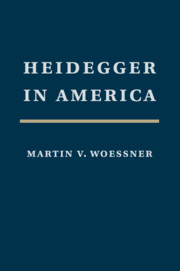Book contents
- Frontmatter
- Contents
- Preface
- Introduction: Being Here
- 1 Freiburg Bound
- 2 Exiles and Emissaries
- 3 Nihilism, Nothingness, and God
- 4 An Officer and a Philosopher
- 5 Dasein and das Man
- 6 The Continental Divide
- 7 Richard Rorty and the Riddle of the Book that Never Was
- 8 Ethics, Technology, and Memory
- 9 Culture Wars
- Conclusion: Being There
- Index
- References
1 - Freiburg Bound
The Early Years of American Heidegger Scholarship
Published online by Cambridge University Press: 04 February 2011
- Frontmatter
- Contents
- Preface
- Introduction: Being Here
- 1 Freiburg Bound
- 2 Exiles and Emissaries
- 3 Nihilism, Nothingness, and God
- 4 An Officer and a Philosopher
- 5 Dasein and das Man
- 6 The Continental Divide
- 7 Richard Rorty and the Riddle of the Book that Never Was
- 8 Ethics, Technology, and Memory
- 9 Culture Wars
- Conclusion: Being There
- Index
- References
Summary
Where there is so much smoke there must be a little fire.
Sidney HookAmericans have been traveling to Europe for their schooling for a very long time. In the nineteenth century, before American universities even offered advanced degrees that meant something – “graduate or professional training worthy of the name,” writes historian Peter Novick, “hardly existed in the United States until the century was well advanced” – eager students of means boarded a ship to Europe in order to continue their studies. For most of these individuals, Germany proved the ideal destination; it was, after all, the birthplace of the modern research university. Equally important was the fact that a German education was less costly than one obtained in England or in France. German universities in the nineteenth century and into the early twentieth century were the home of Wissenschaft, but they were also, as Novick suggests, the places where you could get the most bang for your buck. A degree from Heidelberg, Leipzig, or Berlin was both more rigorous and more affordable than anything an American could obtain in Paris or across the channel at Oxford or Cambridge – all this and there was plenty of beer, too.
Professional philosophy, which, like professional history (the subject of Novick's work), did not exist in the United States before the late nineteenth century, often took its cues from across the Atlantic.
- Type
- Chapter
- Information
- Heidegger in America , pp. 15 - 39Publisher: Cambridge University PressPrint publication year: 2010



